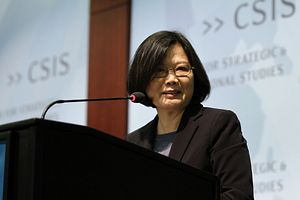Shortly after Tsai Ing-wen, the candidate of Taiwan’s Democratic Progressive Party, was elected the president of the Republic of China on January 16, 2016, Xinhua News Agency published a commentary on the election.
According to Xinhua, the election is considered an “internal affair” of Taiwan and therefore its outcome is a result of multiple factors within Taiwan such as the economic performance, the people’s livelihood, the social situation, the sentiment of young voters, etc. Interestingly, the article ruled out the influence of the Chinese mainland in the polls. In the meantime, it did not mention any other “external forces” responsible for this outcome — such as a backlash against current President Ma Ying-jeou’s cross-strait policies.
In fact, the mainland’s policy toward Taiwan is judged to have been so successful that no one, including Tsai Ing-wen, could afford to oppose current trends. According to the article, the majority of Taiwanese accept the KMT’s cross-strait policy. They do not wish to see either a reversal of the good relationship between Taiwan and the mainland or the loss of the “peace dividend” of the cross-strait relationship. Since the mainland’s peaceful development policy has been endorsed by the Taiwanese people and supported by international society, Xinhua argues, Tsai did not dare to publicly denounce the “1992-consensus” (an agreement reached in Hong Kong in 1992 between Beijing and the KMT that acknowledges the one-China principle but allows different interpretations of “one China”). Instead, she proposed the “maintenance of status quo” as her mainland policy.
Beijing now holds the Democratic Progressive Party (DPP) and Tsai accountable for maintaining the status quo of peaceful development between two sides of the Taiwan Strait, for continuing to improve cross-strait relations, and for continuing to expand the “peace dividend.” Without a peaceful and stable relationship with the mainland, the article warned, the new Taiwanese government will not be able to solve domestic issues such as ensuring economic growth, the people’s livelihood, and future prospects for the young generation.
Xinhua also warned that if the DPP and Tsai promote “peaceful Taiwan independence” or “de jure Taiwan independence,” they will become “troublemakers” in cross-strait relations, jeopardizing Taiwan’s stability and development. Consequently, the article predicted, Taiwan’s voters would be disappointed enough to kick out such a “troublemaking regime” in the next general election. The article warned that Tsai and her team should learn a lesson from Chen Shui-bian, the last DPP president who stirred up cross-strait troubles but ended up in jail for corruption.
The Xinhua article is very confident about the future of cross-strait relations, because the mainland has been in the driver’s seat in the past and will be so in the future. In the end, Xinhua concludes, the DPP’s time in power will be as transient as a fleeting cloud (guo yan yun yan); the key is the development of the Chinese mainland. As long as the mainland is able to manage its own affairs well, it should not worry too much about political changes in Taiwan.
According to the article, there are good reasons to believe that, under the leadership of Xi Jinping, people from both sides of the Taiwan Strait will maintain momentum for peaceful development, further promote cross-strait relations, and realize the Chinese dream of the revival of the Chinese nation.
It is not clear whether Tsai is convinced of these arguments, but she too is very positive about the future of cross-strait relations.

































